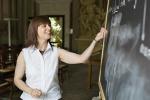
Katrin Wendland
- Born inGermany
- Studied inGermany
- Lives inGermany
Interview
Photo Copyright: Noel Tovia Matoff, www.matoff.de
This is an EXCERPT of the interview from the catalogue “Women of Mathematics Throughout Europe, a Gallery of Portraits”, published in Verlag am Fluss 2016, [email protected], and featured among thirteen portraits in the corresponding exhibition http://womeninmath.net. See also the EWM newsarticle.
We would like to thank Sylvie Paycha, Sara Azzali, Alexandra Antoniouk, Magdalena Georgescu, and Noel Tovia Matoff for allowing us to use the interview excerpts. Moreover, we acknowledge the work of Veronica Corona and Joana Grah for editing the interview excerpts.
How and when did you choose to do mathematics?
I chose mathematics and physics after secondary school. I also liked other subjects, such as German; I used to like reading and writing, and still do. I was also intrigued by history of arts and architecture, but did not think I was creative enough for those subjects. Philosophy and ancient Greek also attracted me. But most of all, I loved mathematics and physics. (…)
I thought this was a good opportunity to become bilingual in mathematics and physics and therefore decided to do my PhD in theoretical physics.
Mathematics requires a lot of creativity. I will not judge whether or not I am creative, but I definitely have a lot of curiosity. This is similar to the enjoyment that I feel when I travel to new places, exploring them and then, too, experiencing the thrill of being lost in a city I do not know.
Did you come across obstacles in pursuing your career as a mathematician?
In Germany, there is social pressure which can be discouraging for women wanting to become professional mathematicians. I personally did not experience such obstacles, probably because my family taught me not to care too much what other people think. I believe this helped me to steer through situations where only much later I understood that they were supposed to be obstacles. I used to have many doubts about myself, particularly when between my Masters and my PhD. With time I learned to gain in patience, and doubt less. I now realise from my experience as a mentor for young women mathematicians, that women have more doubts about themselves than men do. During the rough time I had between my Masters and my PhD, I kept myself going by thinking that, since I had the privilege over many others to have gone that far, it was my duty to keep going.
In retrospect, are you happy to have chosen mathematics or do you have some regrets? For you, what are the joys of mathematics? What are the hardships?
I do not have any regrets, as a principle, not only in mathematics; you never know how things might have turned out, had you made other choices. I enjoy being surprised by mathematics and its intrinsic difficulty. The moment I enjoy best is when the pieces of the puzzle fall into one coherent whole. Understanding or solving a problem is a real source of joy. I do not mind working alone, which can be a hardship for some. But I love discussing mathematics with others, for it gives you other viewpoints on things. Teaching is also a very nice part of my job. I enjoy helping students out when they get stuck on a problem. The many different aspects of mathematics make it a very appealing subject.
(…)
What would you recommend to a young woman in your country wanting to start a career in mathematics?
A young woman who has just finished school I would advise to give it a try, and be honest with herself as to whether she enjoys mathematics or not. I would recommend that she be patient, and to keep on trying when an obstacle comes in the way. If doubts emerge later on in her career, such as thinking that she is not “good enough”, I would ask her why and tell her to trust her own abilities. Such doubts often arise from a mere lack of self-confidence. It is a good thing to be self-critical, but you should not put yourself down! I personally proceeded step by step, not allowing myself to plan too far ahead.
(…)
